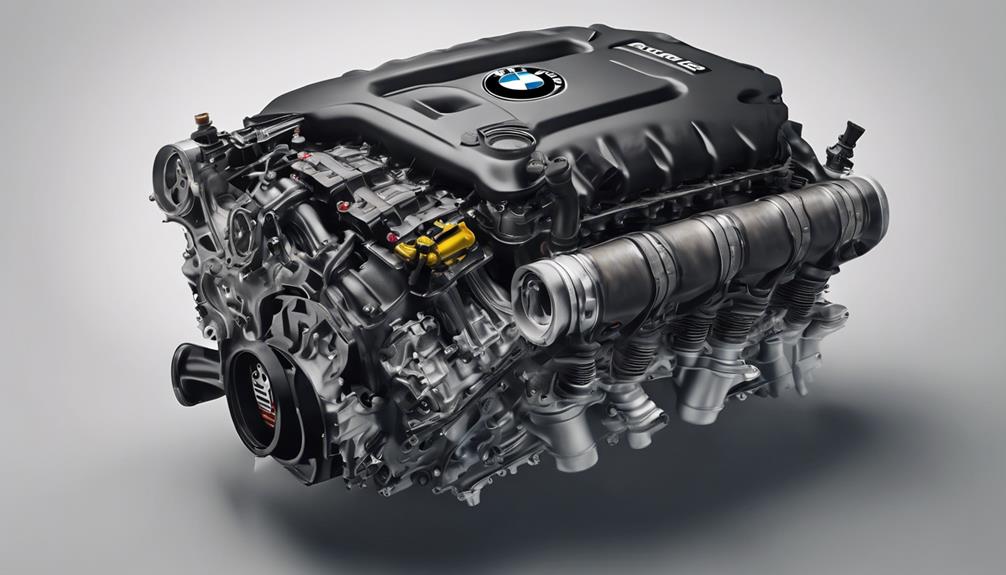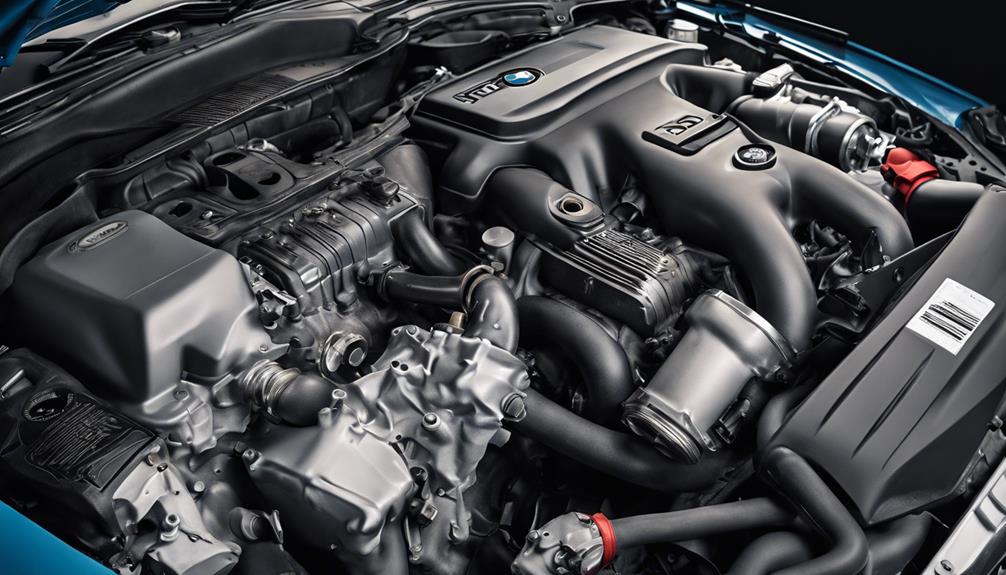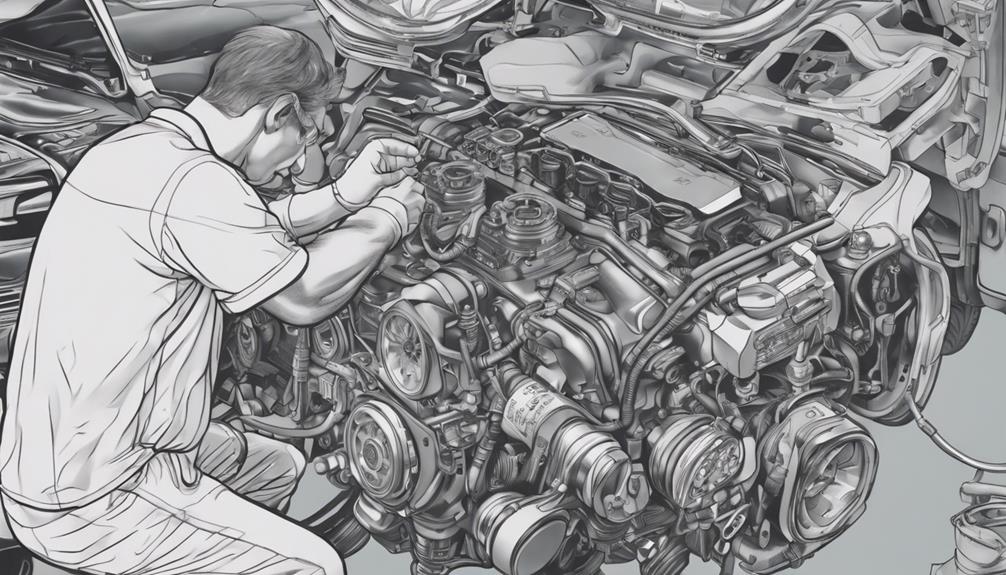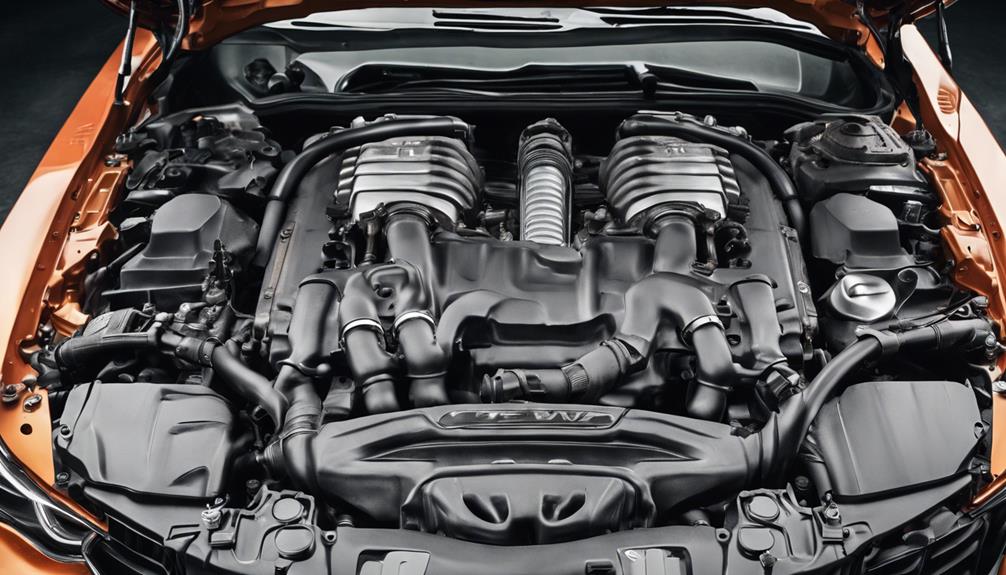If you're delving into the world of BMW B58 engines, brace yourself for challenges like electronic wastegate failures causing power dips and irregular boost issues, fuel injector faults leading to misfires and decreased efficiency, and high-pressure fuel pump troubles triggering misfires and power loss. Keep an eye out for VANOS solenoid hiccups causing power loss and rough idling, as well as valve cover gasket leaks from wear and tear that can impact engine function. Stay sharp on coolant upkeep to prevent overheating, and watch out for engine performance concerns like carbon buildup, timing chain tensioner problems, and more. Sharp turns ahead for B58 engine owners!
Key Takeaways
- Electronic wastegate failure can lead to power loss and irregular boost pressure.
- Fuel injector faults cause misfires, decreased efficiency, and potential engine damage.
- High-pressure fuel pump issues result in misfires, rough idling, and engine stalling.
- VANOS solenoid problems lead to power loss, rough idling, and potential limp mode activation.
- Valve cover gasket leaks stem from wear, poor maintenance, and aggressive driving, impacting engine health.
Electronic Wastegate Failure
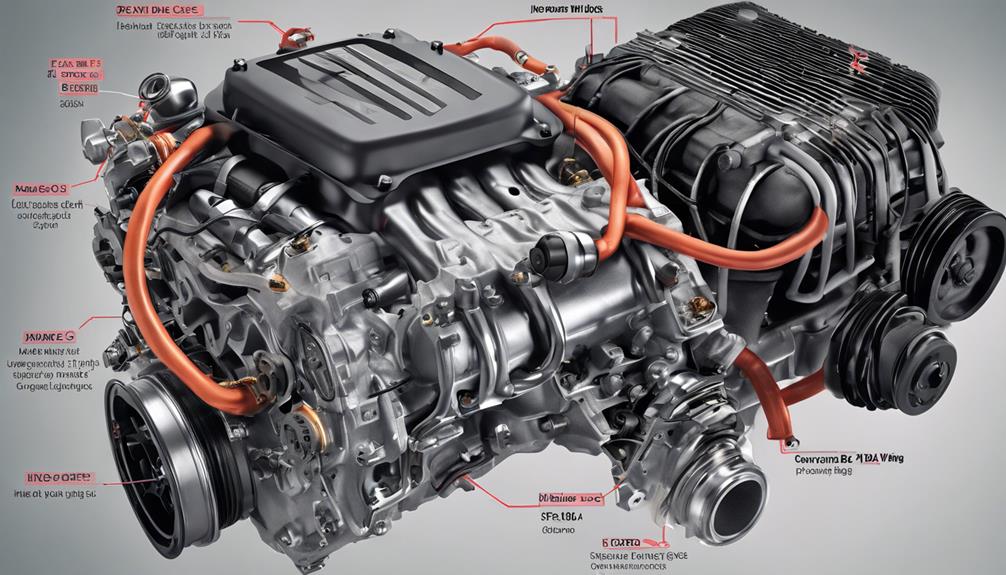
If your BMW B58 engine experiences electronic wastegate failure, be prepared for potential turbocharger complications that can greatly impact performance and reliability. Electronic wastegates play an important role in regulating boost pressure in turbocharged engines. When these components fail, it can lead to a domino effect of issues.
You may notice decreased power, irregular boost pressure fluctuations, and pesky check engine lights popping up. The electronic wastegate is like the conductor of a turbocharger orchestra, ensuring everything operates harmoniously. Without this conductor, chaos ensues, potentially causing damage to the turbo system and diminishing overall engine performance.
Proper diagnosis and timely replacement of the electronic wastegate are essential to restoring your BMW's engine to its full potential. So, if you start experiencing symptoms like decreased power or erratic boost pressure, don't ignore them. Addressing electronic wastegate failure promptly can save you from a symphony of turbocharger troubles down the road.
Fuel Injector Faults
Experiencing fuel injector faults in your BMW B58 engine can lead to a cascade of issues affecting performance and efficiency. When fuel injectors start acting up, misfires and rough idling can quickly become your car's new norm.
Not only will you feel the engine's hesitation during acceleration, but you might also notice decreased fuel efficiency, hitting your wallet where it hurts the most. Imagine the annoyance of your BMW stalling at a red light or the embarrassment of a shaky engine disrupting your smooth ride.
These symptoms aren't just a nuisance; they can signal potential engine damage if left unattended. Promptly addressing fuel injector faults is key to avoiding costly repairs and ensuring your B58 engine operates at its best.
High-Pressure Fuel Pump Issues
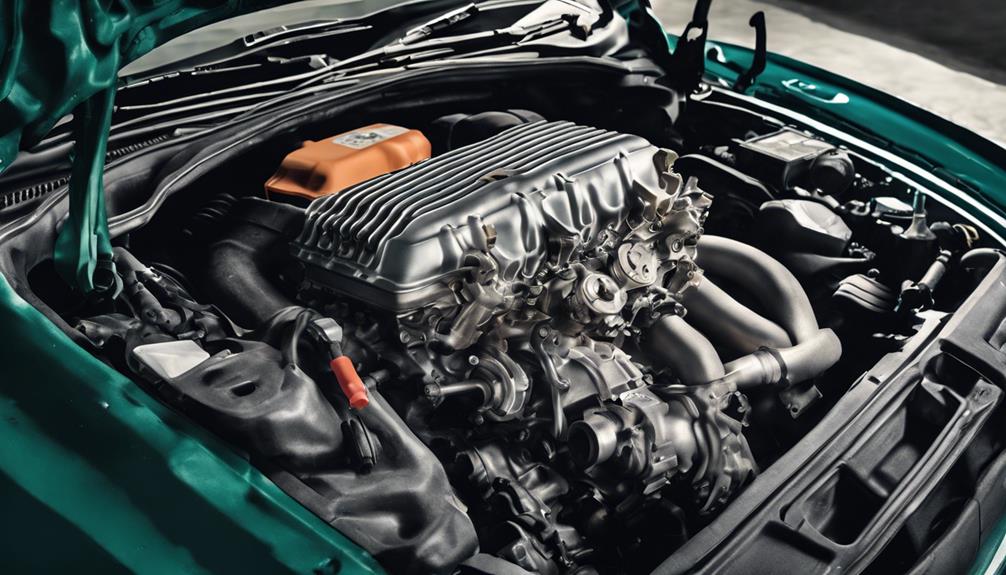
High-pressure fuel pump issues in BMW B58 engines can cause a range of performance setbacks, from misfires to engine stalling, necessitating immediate attention to maintain peak driving conditions. Here are five key points to ponder regarding high-pressure fuel pump problems:
- Engine misfires: A failing fuel pump can disrupt the fuel delivery process, leading to misfires and a noticeable decrease in engine performance.
- Rough idling: When the high-pressure fuel pump struggles to supply the engine with the required fuel, rough idling can occur, causing vibrations and instability when the vehicle is at a standstill.
- Loss of power: Inadequate fuel pressure from a faulty pump can result in a significant loss of power during acceleration, impacting the overall driving experience.
- Engine stalling: In severe cases, a failing high-pressure fuel pump can cause the engine to stall unexpectedly, posing a safety hazard on the road.
- Immediate replacement: Addressing high-pressure fuel pump issues promptly is essential to prevent further damage and restore the engine's optimal functionality.
VANOS Solenoid Problems
You're revving up your BMW B58 engine, but those VANOS solenoids might be causing you some trouble.
From degraded o-rings to clogging, these little components can pack a big punch of problems.
Keep an eye out for power loss, rough idling, or even a potential limp mode activation – signs that your VANOS solenoids might need some attention.
VANOS Solenoid Function
Controlling valve timing in BMW B58 engines, the VANOS solenoid operates by regulating oil pressure changes. Understanding how this component functions is essential for diagnosing potential issues.
Here are some insights into the VANOS solenoid's role:
- The VANOS solenoid is responsible for adjusting the timing of the intake and exhaust camshafts.
- It guarantees optimal engine performance by varying the timing based on driving conditions.
- Oil pressure fluctuations impact the solenoid's ability to adjust the camshafts effectively.
- Failure to maintain proper oil levels can lead to VANOS solenoid malfunctions.
- Regular inspection and maintenance help prevent costly repairs down the road.
Common VANOS Issues
When facing common VANOS issues in BMW B58 engines, attention to deteriorated o-rings or blockage is vital for diagnosing potential problems effectively. The VANOS solenoid issues in B58 engines can appear as power loss, rough idle, or even trigger limp mode.
To prevent VANOS solenoid failures, consider replacing seals every 50,000 miles as a proactive measure. BMW recommends a complete VANOS system replacement around 70,000 miles for preventive maintenance.
The essential role of the solenoid in controlling the VANOS system via oil pressure changes underscores the significance of proper maintenance. Stay vigilant about the condition of o-rings and make sure they aren't the cause behind any VANOS issues in your B58 engine.
Troubleshooting VANOS Problems
To effectively troubleshoot VANOS problems in BMW B58 engines, meticulous attention to the solenoid's functionality and potential issues is crucial. Here are some key points to bear in mind when dealing with VANOS solenoid problems:
- Check for oil leaks around the solenoid.
- Inspect the wiring harness for any signs of damage.
- Clean the solenoid filter to guarantee proper oil flow.
- Monitor for irregular engine noises that may suggest solenoid issues.
- Ponder replacing the solenoid as part of preventive maintenance to avoid future complications.
Valve Cover Gasket Leaks
So, you've noticed that burning oil smell and those soaked spark plugs – classic signs of a valve cover gasket leak in your BMW B58 engine. The culprit? Extreme heat cycles accelerating rubber gasket wear, leading to those pesky leaks.
Stay tuned as we explore the causes, repair methods, and prevention strategies for tackling this common issue head-on.
Causes of Leaks
Rubber gasket wear in BMW B58 engines, typically occurring between 60,000-100,000 miles, is often attributed to the engine's exposure to extreme heat cycles. When it comes to the causes of leaks in valve cover gaskets, here are some key factors to take into account:
- Engine's exposure to extreme heat cycles accelerates rubber gasket wear.
- Poor maintenance practices can lead to premature gasket deterioration.
- Using low-quality engine oil may affect the gasket's longevity.
- Aggressive driving styles can put extra stress on the gaskets, leading to leaks.
- Environmental factors like temperature fluctuations can impact gasket performance.
Understanding these causes can help you take proactive steps to prevent or address valve cover gasket leaks in your BMW B58 engine.
Repair and Prevention
When addressing valve cover gasket leaks in BMW B58 engines, meticulous inspection and timely maintenance play an essential role in preventing costly repairs.
These leaks, often surfacing between 60,000-100,000 miles, manifest through symptoms like a burning oil smell, soaked spark plugs, and low-oil warning lights.
The accelerated wear of rubber gaskets in B58 engines, exacerbated by extreme heat cycles, is a primary culprit behind these leaks. While B58 engines incorporate a heat retention system to mitigate gasket wear, early detection and vigilant monitoring remain paramount.
Excessive Coolant Consumption
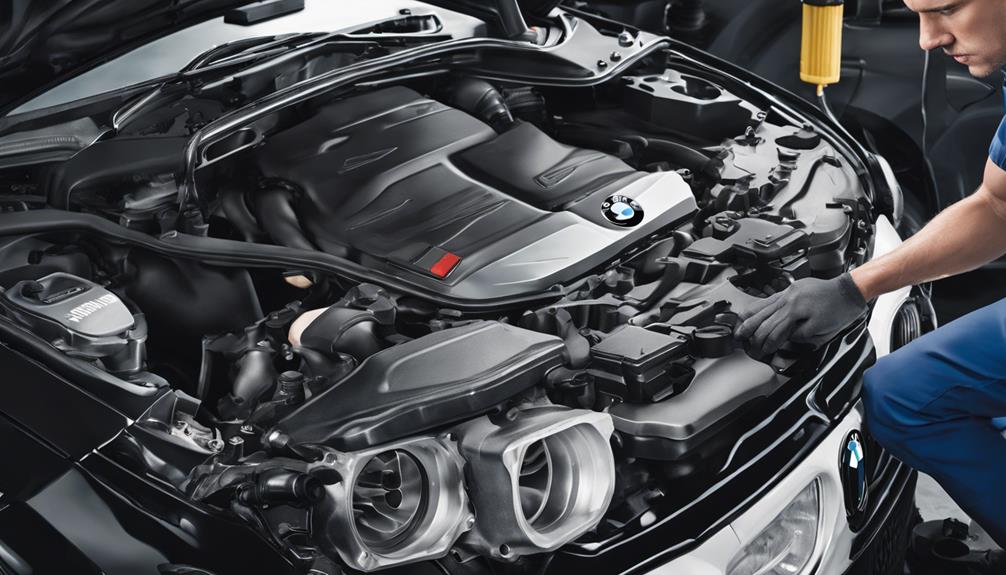
Experiencing excessive coolant consumption in your B58 engine could indicate potential issues with faulty caps or cooling system seals. It's essential to address this promptly to prevent any further complications.
- Faulty Caps: Check for any signs of wear or damage on the coolant caps, as these can lead to leaks and increased coolant consumption.
- Cooling System Seals: Inspect the seals for any cracks or leaks that could be causing the coolant to escape, leading to the need for more frequent top-ups.
- Regular Monitoring: Keep a close eye on your coolant levels and address any sudden drops promptly to avoid overheating and engine damage.
- Preventive Maintenance: Regular checks for leaks and cap integrity can help prevent excessive coolant consumption, ensuring your engine runs smoothly.
- Timely Action: Don't ignore gradual coolant loss; take action early to maintain the health of your B58 engine and prevent costly repairs down the line.
Engine Performance Concerns
Engine performance concerns in B58 engines can manifest in various ways, impacting the overall driving experience and potentially indicating underlying issues that require attention.
Carbon buildup on intake valves is a common culprit, hindering airflow and combustion efficiency. This buildup can lead to rough idling, decreased power output, and poor fuel economy.
High-pressure fuel pump failures are another known issue affecting engine performance; symptoms include misfires, loss of power, and rough running.
Timing chain tensioner problems have also been reported in some B58 engines, causing engine rattling noises and potential drivability issues.
Additionally, coolant leaks from the thermostat housing can result in overheating, affecting the engine's ability to operate optimally.
Addressing these concerns promptly through regular maintenance and inspections can help preserve the performance and longevity of your B58 engine.
Frequently Asked Questions
What Is the Common Failure of the B58?
When it comes to the common failure of the B58 engine, the VANOS solenoid is a culprit due to o-ring wear or blockage. You might notice power loss, rough idle, or limp mode. Regular checks and maintenance can prevent major issues.
How Much Is a BMW B58 Engine Replacement?
Replacing a BMW B58 engine can range from $8,000 to $15,000, contingent on the model and labor costs. Opting for a rebuilt engine at $3,000 to $7,000 or DIY installation could offer more budget-friendly alternatives.
Is the B58 Hard to Work On?
Working on a B58 engine can be moderately challenging due to its compact design and intricate components. Accessing certain parts like turbos and exhaust components may require extra time and effort. Specialized tools and BMW knowledge are key.
Does the B58 Have a Timing Belt or Chain?
The BMW B58 engine uses a timing chain, not a timing belt, ensuring durability and longevity. This chain synchronizes camshafts and the crankshaft for peak performance. Regular maintenance and oil changes are key for its proper function.
Conclusion
So, if you find yourself experiencing any of these common problems with your BMW B58 engine, don't fret! Remember to address them promptly to keep your engine running smoothly.
Whether it's electronic wastegate failure or valve cover gasket leaks, staying on top of maintenance will help you avoid bigger issues down the road.
Keep an eye out for any signs of trouble and address them promptly to keep your BMW performing at its best.





